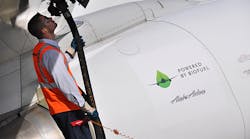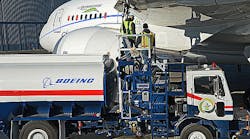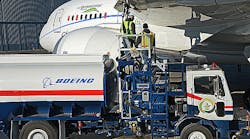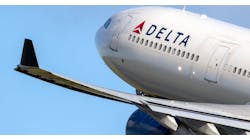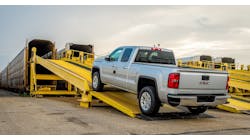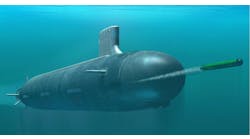Boeing Commercial Airplanes is joining the Port of Seattle and Alaska Airlines in a partnership to identify the prospects for “sustainable aviation biofuel.” At the Seattle-Tacoma International Airport fuel production and handling operation (a “fuel farm”), executives of the three partner companies signed a memorandum of understanding to launch a $250,000 Biofuel Infrastructure Feasibility Study, to assess the costs and infrastructure needed to deliver a blend of aviation biofuel and conventional jet fuel for aircraft at Sea-Tac.
The stated goal of the project is to have all flights by all airlines at Sea-Tac powered by a sustainable aviation fuel, and the infrastructure and delivery stages are described as a crucial step toward routine biofuel use in the future. In the longer-term, the plan is to incorporate significant quantities of biofuel into the airport’s fuel infrastructure, which supports 26 airlines and more than 380,000 flights annually, with over 42 million domestic and international passengers this year.
A blend of aviation biofuel and regular petroleum-based jet fuel has been approved to power commercial airplanes without any changes to the aircraft or engines. Since 2011, airlines have flown over 2,000 flights with such a blend. According to the U.S. Department of Energy, a sustainably produced biofuel may reduce lifecycle CO2 emissions 50-80% compared to conventional petroleum fuel.
The Port of Seattle aims to reduce aircraft-related carbon emissions at Sea-Tac Airport by 25% by 2037, mainly by adopting aviation biofuel. Sea-Tac is the first U.S. airport to outline a plan for incorporating aviation biofuel into its infrastructure.
“As leaders in aviation biofuels, this will send a signal to airlines and biofuel producers that Sea-Tac Airport will be ready to integrate commercial-scale use of aviation biofuels,” stated Port commissioner John Creighton. “Biofuel infrastructure will make Sea-Tac Airport an attractive option for any airline committing to use biofuel, and will assist in attracting biofuel producers to the region as part of a longer-term market development strategy.”
The Port will manage the $250,000 study as the biofuel road-mapping process. It also would oversee engineering and integration of the airport’s fuel farm: an infrastructure study will be initiated and completed next year.
Boeing, which partners globally to develop and commercialize sustainable aviation biofuel, is providing expertise about approaches to develop a regional biofuel supply chain to serve the airport, including fuel types, fuel producers, processing technologies and integration with airplanes.
“Sustainable aviation biofuel will play a critical role in reducing aviation’s carbon emissions over the long term,” said Sheila Remes, Boeing Commercial Airplanes vice president of Strategy.
